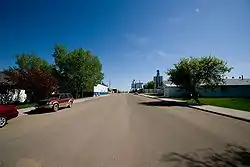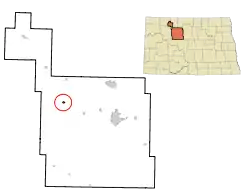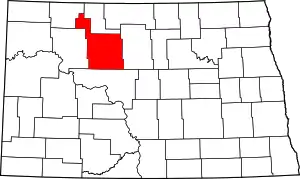Berthold, North Dakota
Berthold is a city in Ward County, North Dakota, United States. The population was 454 at the 2010 census.[5]
Berthold, North Dakota | |
|---|---|
 Street in Berthold, North Dakota | |
| Motto(s): "Life In Berthold Is All Ways Good" | |
 Location of Berthold, North Dakota | |
| Coordinates: 48°18′58″N 101°44′9″W | |
| Country | United States |
| State | North Dakota |
| County | Ward |
| Area | |
| • Total | 1.19 sq mi (3.07 km2) |
| • Land | 1.19 sq mi (3.07 km2) |
| • Water | 0.00 sq mi (0.00 km2) |
| Elevation | 2,090 ft (637 m) |
| Population | |
| • Total | 454 |
| • Estimate (2019)[3] | 481 |
| • Density | 405.91/sq mi (156.74/km2) |
| Time zone | UTC-6 (Central (CST)) |
| • Summer (DST) | UTC-5 (CDT) |
| ZIP code | 58718 |
| Area code(s) | 701 |
| FIPS code | 38-06460 |
| GNIS feature ID | 1027915[4] |
| Website | tradecorridor.com/berthold |
History
Berthold was founded in 1900.
Geography
Berthold is located at 48°18′58″N 101°44′9″W (48.316025, -101.735776).[6] According to the United States Census Bureau, the city has a total area of 0.37 square miles (0.96 km2), all land.[7]
Demographics
| Historical population | |||
|---|---|---|---|
| Census | Pop. | %± | |
| 1910 | 454 | — | |
| 1920 | 498 | 9.7% | |
| 1930 | 511 | 2.6% | |
| 1940 | 428 | −16.2% | |
| 1950 | 459 | 7.2% | |
| 1960 | 431 | −6.1% | |
| 1970 | 398 | −7.7% | |
| 1980 | 485 | 21.9% | |
| 1990 | 409 | −15.7% | |
| 2000 | 466 | 13.9% | |
| 2010 | 454 | −2.6% | |
| 2019 (est.) | 481 | [3] | 5.9% |
| U.S. Decennial Census[8] 2018 Estimate[9] | |||
Berthold is part of the Minot Micropolitan Statistical Area.
2010 census
At the 2010 census there were 454 people in 166 households, including 120 families, in the city. The population density was 1,227.0 inhabitants per square mile (473.7/km2). There were 178 housing units at an average density of 481.1 per square mile (185.8/km2). The racial makup of the city was 98.7% White, 0.2% African American, and 1.1% from two or more races. Hispanic or Latino of any race were 1.8%.[2]
Of the 166 households 37.3% had children under the age of 18 living with them, 63.3% were married couples living together, 5.4% had a female householder with no husband present, 3.6% had a male householder with no wife present, and 27.7% were non-families. 25.3% of households were one person and 9.6% were one person aged 65 or older. The average household size was 2.73 and the average family size was 3.31.
The median age was 37.2 years. 33.3% of residents were under the age of 18; 4.5% were between the ages of 18 and 24; 26% were from 25 to 44; 22.8% were from 45 to 64; and 13.2% were 65 or older. The gender makeup of the city was 52.2% male and 47.8% female.
2000 census
At the 2000 census, there were 466 people in 170 households, including 131 families, in the city. The population density was 1,214.7 people per square mile (473.5/km2). There were 181 housing units at an average density of 471.8 per square mile (183.9/km2). The racial makup of the city was 98.07% White, 0.21% African American, 0.21% Asian, 0.43% from other races, and 1.07% from two or more races. Hispanic or Latino of any race were 1.29% of the population.
Of the 170 households 40.6% had children under the age of 18 living with them, 69.4% were married couples living together, 5.3% had a female householder with no husband present, and 22.9% were non-families. 21.8% of households were one person and 14.1% were one person aged 65 or older. The average household size was 2.74 and the average family size was 3.21.
The age distribution was 31.8% under the age of 18, 4.5% from 18 to 24, 32.0% from 25 to 44, 16.5% from 45 to 64, and 15.2% 65 or older. The median age was 34 years. For every 100 females, there were 99.1 males. For every 100 females age 18 and over, there were 101.3 males.
The median household income was $35,000 and the median family income was $43,500. Males had a median income of $28,250 versus $20,000 for females. The per capita income for the city was $17,683. About 5.6% of families and 6.6% of the population were below the poverty line, including 6.8% of those under age 18 and 10.7% of those age 65 or over.
Site of interest
- Berthold Public School Arboretum
See also
References
- "2019 U.S. Gazetteer Files". United States Census Bureau. Retrieved July 27, 2020.
- "U.S. Census website". United States Census Bureau. Retrieved June 14, 2012.
- "Population and Housing Unit Estimates". United States Census Bureau. May 24, 2020. Retrieved May 27, 2020.
- "US Board on Geographic Names". United States Geological Survey. October 25, 2007. Retrieved January 31, 2008.
- "2010 Census Redistricting Data (Public Law 94-171) Summary File". American FactFinder. United States Census Bureau. Retrieved May 2, 2011.
- "US Gazetteer files: 2010, 2000, and 1990". United States Census Bureau. February 12, 2011. Retrieved April 23, 2011.
- "US Gazetteer files 2010". United States Census Bureau. Retrieved June 14, 2012.
- United States Census Bureau. "Census of Population and Housing". Retrieved October 23, 2013.
- "Population Estimates". United States Census Bureau. Retrieved June 16, 2019.
